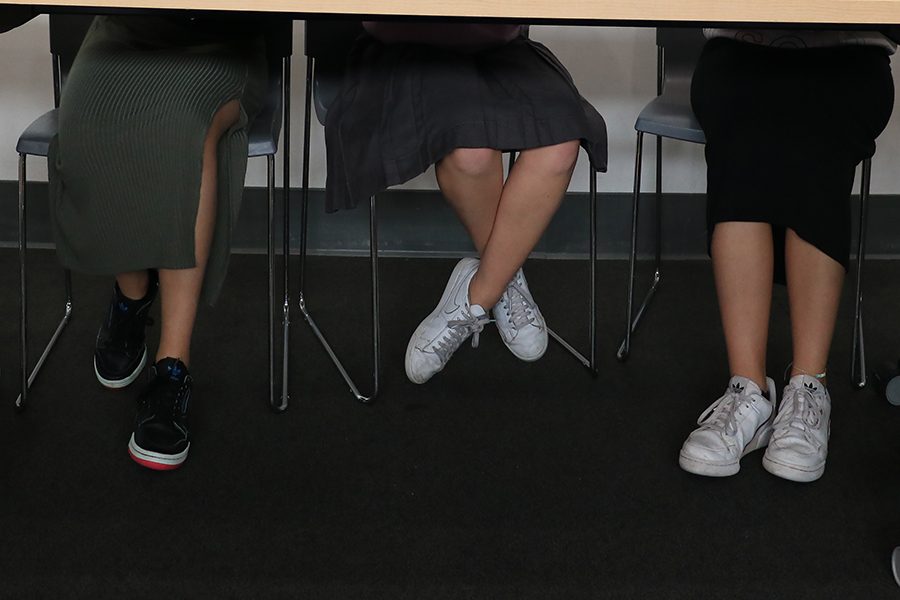School cracks down on pencil skirts; midis and maxis preferred
LONGER: Freshmen Amalia Abecassis, Zoe Miller and Tehilla Fishman worked on a class project last month. This year, girls are wearing midi, maxi and uniform skirts after Shalhevet changed its dress code to ban knee-length pencil skirts.
Shalhevet changed its girls dress code over the summer, announcing that girls would no longer be allowed to wear pencil skirts unless they are at least knee-length and worn with leggings underneath.
According to the policy, which was e-mailed to families July 31 with a letter from Associate Head of School Rabbi David Block and Yoetzet Halacha Atara Segal, if more than 15 students are dress-coded within any one month of school for wearing leggings and a pencil skirt that is too short, this option, too, will be taken away for the rest of the year.
The policy also allows girls to wear looser skirts to the knee, midi-skirts that reach mid-calf, and maxi-skirts, says the policy, which is published on Page 6 of the 2019-20 Student Handbook.
Although dress code is a perennial topic of Town Hall discussions, tweaking and occasional student input — for example, when students suggested boys be allowed to wear t-shirts if their tzitzit are out — it is not officially subject to student voting because it is also a matter of Jewish law.

“Because of the sensitivity of halakhic and communal norms, this is not one of the areas which can be given over entirely to the democratic process,” the email states.
“At the same time, we care deeply about what you believe and experience, and your voice is crucial in the conversation,” it continues. “In that vein, back in the Spring, we met with many students to hear your thoughts and opinions, and we solicited input and suggestions from the entire student body.”
Student and parent input was gathered informally, through Schoology-announced emails and meetings last spring, according to school officials and students.
Seniors Maital Hiller and Elianna Kupferman had the idea of authorizing leggings with a pencil skirt.
“It was a great way to find common ground between what the administration wants and what the students want,” said Maital. “It was nice that the administration was trusting us to still be able to wear pencil skirts and leggings underneath.”
Yoetzet Segal said the new policy was not meant as a punishment for the girls but rather as a solution for problems of immodesty associated with pencil skirts, including skirts “riding up,” rules being applied differently depending on students’ height or body type, the school having a rule left unfollowed, and other issues that have arisen in recent years.
“It’s much easier sometimes to make a clear policy that’s much more objective and doesn’t have subjectivity to it,” Ms. Segal said.
“Instead of having constant fighting, like having to call people on it and then arguing like this is too low, this is too tight, this is too this,” she said, the new policy can eliminate feelings of bias or arguments, due to its objectivity.
Two open discussion opportunities were announced at Town Hall in the spring of last year, inviting teachers and students to discuss their opinions on dress code and how it could be improved. The meetings took place in Yoetzet Segal’s office.
Students and teachers cannot remember the dates, but sophomore Victory Fuchs attended both meetings and is pleased with the new policy. She had already thought the faculty needed to be stricter about dress-coding students.
“Girls wouldn’t get dress-coded for having short skirts,” said Victory, “and so instead of just cracking down on that they made a stricter rule, which works.”
The discussion continued in a WhatsApp group chat including Mrs. Segal and 28 students who had attended the group discussions. In person, Maital and Eliana brought the idea of allowing pencil skirts with leggings to Mrs. Segal and the chat continued to talk over text about the idea during the remaining months of the school year.
Also before deciding on the new policy, Yoetzet Segal said she had had many one-on-one meetings with parents who had expressed their disappointment witsh dress code in the past.
These concerns were addressed directly in the email sent out to parents on July 31.
“Having guidelines that are consistently not followed harms the Shalhevet school culture we all aim to create,” the email says.
According to Yoetzet Segal, most of the feedback has been in agreement with the new policy.
“I would say I received like 20 emails and I would say of the 20, 16 were like, “Oh my gosh, it’s about time,”’ she said.
Mrs. Segal stated that the remaining emails were not necessarily negative.
“They were more like concerns like ‘how is this going to be applied,’ ‘tell me where we’re supposed to go shopping,’ ‘I find it really hard to shop for my daughter,’” Yoetzet Segal said. “It was more about specific concerns. Valid, for sure valid.”
Student reactions, however, have been less than unanimous. Junior Avital Graber said the new policy is inconvenient.
“Pencil skirts were just a basic,” Avital said. “You knew it could match with anything and you would have an outfit easily. Now, it’s a little bit more of an effort to figure it out. It’s also hot at this time of the year and wearing a long skirt is suffocating.”
Sophomore Barbara Seruya believes the policy is ineffective.
“People still wear them and still, people’s skirts are the same length,” Barbara said.
“What’s worse is that when you walk upstairs [in a loose skirt] you’re literally showing everybody everything. Your skirt flies up or something and people can see underneath, which is gross. I don’t like the policy at all.”
Senior Emma Mackler, who is president of the Fashion Club, said the policy has a definite downside — the reality of the midi-skirt.
“It makes the girls walk like penguins,” said Emma. But she also thinks understanding the school’s values will make following it easier, and plans on leading a Fashion Club meeting dedicated to styling outfits that follow it.
“The pencil skirts that would ride up, I for sure saw an issue with that,” said Emma. “You’re in a Modern Orthodox school, you need to have that level of respect. I’m not saying I’m not guilty of it, too, but I think this is the perfect way to stop that.”
Others were worried about the cost. Senior Rachel Lasry said this would be particularly tough on seniors.
“Seniors who have to invest in a whole new wardrobe in our senior year of high school, which is both a hassle and expensive,” said Rachel.
Some students were bothered that there was no school-wide vote on the dress code change, while others saw a need for the school administrators to be in charge.
Senior and SAC Chair Gabby Lasry believes that a core value of Shalhevet is listening to the students and this policy did not allow for that to happen.
“We pride ourselves on being a Just Community and making sure that students have a voice,” Gabby said. “I think that needs to be done before the school can just make a rule if that’s what we pride ourselves on.”
Agenda chair and senior David Edwards sees both sides.
“I’m not really sure what the admin is supposed to do in this situation, where students are violating the dress code over and over again and then somehow they need to bring it to Town Hall and expect students to maybe vote on a stricter dress code,” David said. “I’m not sure if students would do that.”
Junior Alessandra Judaken believes that this was something important for the administration alone to enforce as the old issues with the dress code affected her view on Shalhevet.
“Although we are a Just Community, it’s okay for the school to take a more aggressive approach on something,” Alessandra said. “Because it’s not a good look when everyone has the tiniest skirts and everything like that at a Jewish school.
“When I first toured the school, which was last year, I remember immediately noticing everyone’s pencil skirts being extremely tight and extremely short and it contradicted my perception of a Modern Orthodox school,” Alessandra said.
Meanwhile, word of the policy caused some consternation over the summer.
Ms. Karen Michelle, owner of the women’s clothing store by that name which focuses on clothing that’s both trendy and modest, heard about the dress code change from Shalhevet students coming to her store.
Ms. Michelle then contacted Mrs. Segal and offered to come to school to give students new skirt options they could buy that would follow the policy. On Aug. 22, she came to school after the freshman orientation with skirts they could buy to replace their pencil skirts.
The new policy, she said, was giving girls tools for being tzniut, or modest, even outside of school, while maintaining the desired atmosphere in school itself.
“These are just guidelines that the school gives you so that you can make choices when you’re older, when you’re over 18 and you’re out and you’re in college,” said Ms. Michelle. “There’s not going to be anyone there skirting you, and so it’s always been what does tznius mean to you?
“When you go somewhere, there’s a rule in place — the environment — and when you’re older you’ll make all the right decisions for you,” she said.

Liad Machmali joined the Boiling Point during her freshman year as a staff writer and was editor of the Torah section in her sophomore year. In her junior year she was editor of the Features, Arts & Culture, and Sports sections of the paper, all at the same time. Her stories are published on various news sites and her column on cheating was published in LA Times High School Insider. While the news is constantly full of heartache and politics, Liad adds a joyful side to the paper and hopes to leave readers smiling. Outside of BP, Liad is also a Co-chair of the Student Activities Committee and a Red Cross Blood Drive Coordinator. During her free time she enjoys shadowing dentists as well as playing tennis and sewing.













